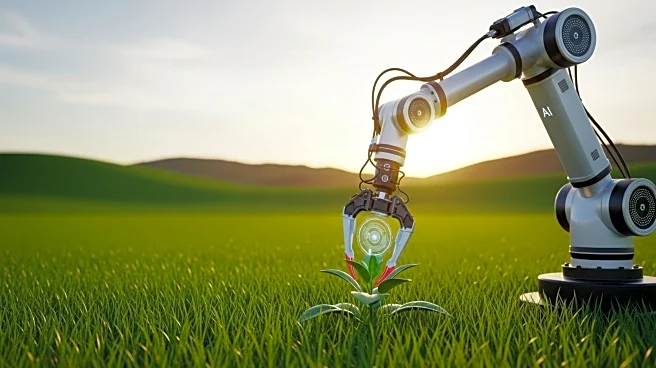What's Happening?
Ares Acres, a U.S.-based agrotechnology company, is revolutionizing farming by integrating agrobotics, unmanned aerial vehicles (UAVs), and artificial intelligence (AI) into agricultural practices. Founded by Brandon Samba, the company aims to address challenges such as rising costs, labor shortages, and environmental pressures faced by farmers. Ares Acres provides tools for precision spraying, seeding, and real-time crop health monitoring, enhancing efficiency and sustainability. Their approach includes accessible financing options to ensure that farms of all sizes can adopt these advanced technologies.
Why It's Important?
The integration of agrobotics and AI by Ares Acres represents a significant shift in the agricultural sector, potentially increasing productivity and sustainability. By optimizing resource use and reducing waste, these technologies can help address environmental concerns and improve food security. The company's focus on making technology accessible to smaller farms could democratize advanced farming practices, supporting local food systems and contributing to long-term agricultural resilience. This development may also influence policy discussions around sustainable farming and technological innovation in agriculture.
What's Next?
Ares Acres plans to continue innovating and expanding its technology offerings to further support U.S. farmers. As the agricultural sector evolves, the company may face increased interest from policymakers and industry leaders looking to leverage technology for sustainable farming solutions. Potential collaborations with educational institutions or government agencies could arise to promote the adoption of agrobotics and AI in agriculture. The success of Ares Acres could inspire other companies to explore similar technological integrations, further transforming the industry.
Beyond the Headlines
The ethical implications of using AI and robotics in farming include concerns about data privacy and the potential displacement of traditional farming jobs. However, the focus on sustainability and efficiency may outweigh these concerns, as the technology supports environmental stewardship and food equity. The long-term impact could include shifts in cultural perceptions of farming, as technology becomes an integral part of agricultural practices.










